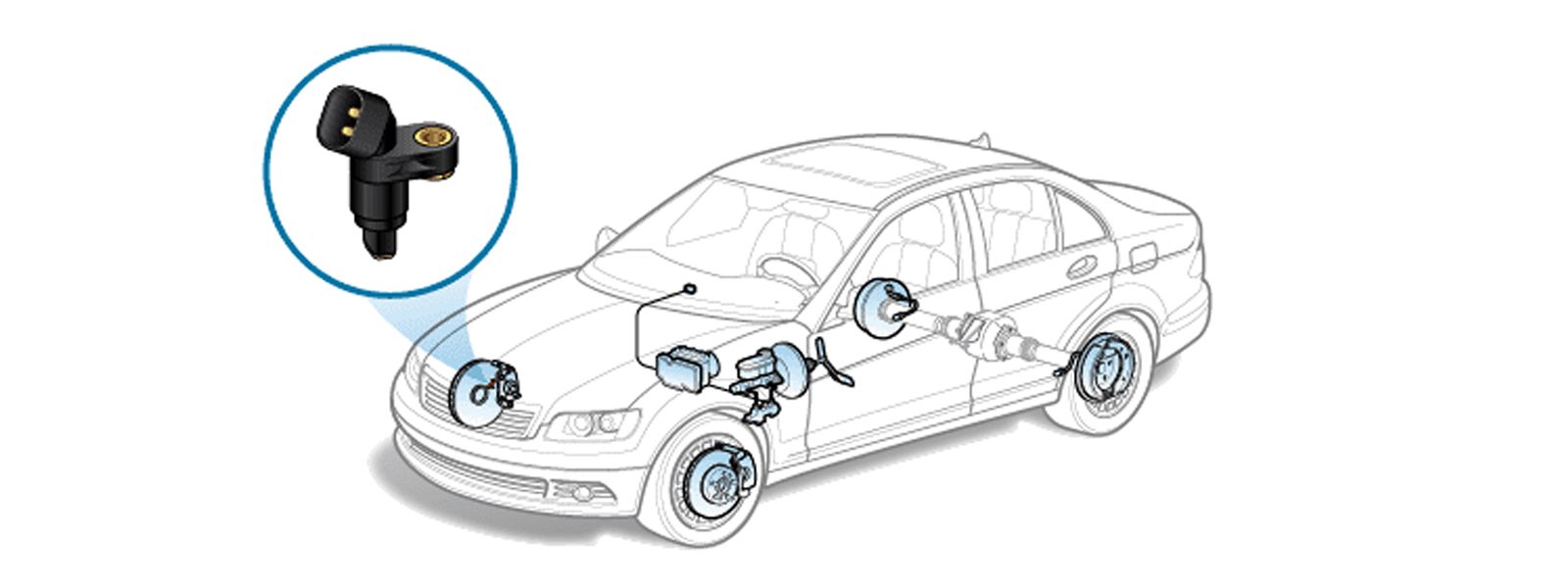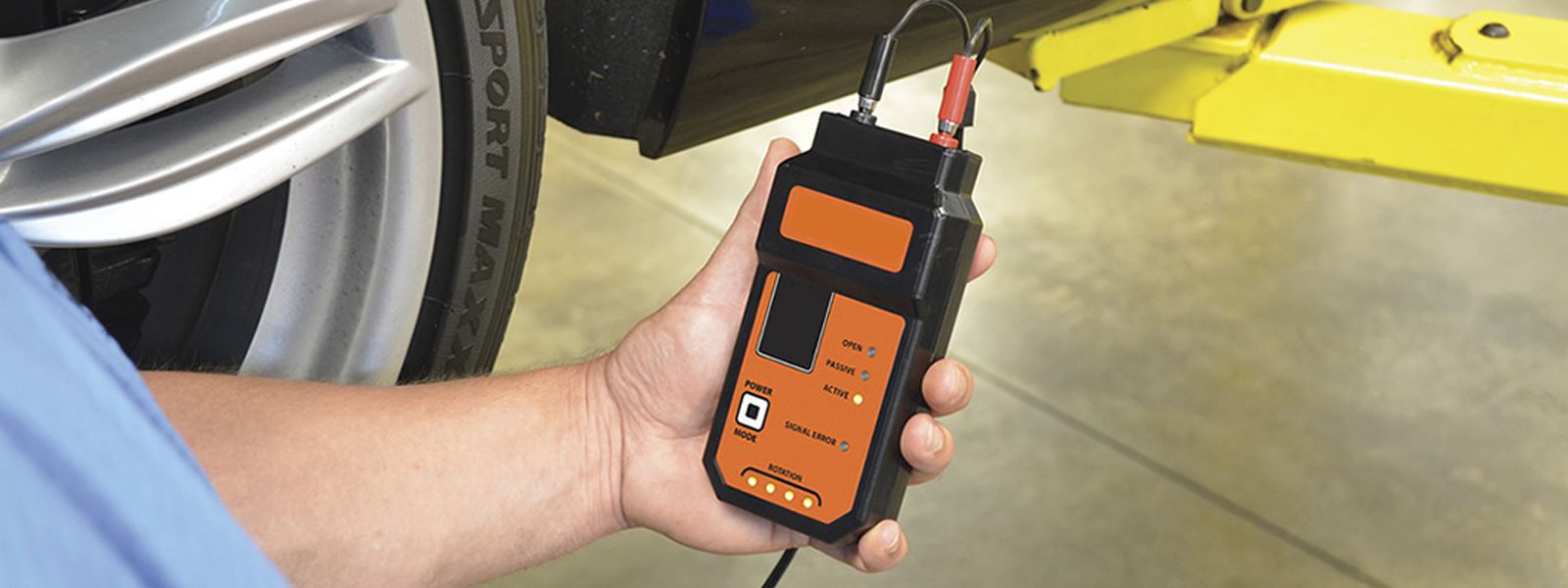
6 Symptoms of a Faulty ABS Speed Sensor

The ABS is a computer controlled mechanism. Therefore the car is able to immediately tell if there is some kind of problem within this system, and will display the problem via the ABS error light on your dashboard.
Suggested A-Premium Parts
Although the fundamental braking components may not have undergone substantial changes, the integration of electronic controls has made braking systems much safer and more intelligent than ever before. Features such as anti-lock brakes (ABS), electronic stability control, and brake assist are now prevalent. However, none of these advanced capabilities would be possible without one small, yet critical component: the ABS or wheel speed sensor.
What does ABS mean
ABS is a vital safety technology that prevents wheel lockup during heavy braking. Using wheel speed sensors, the system detects impending lockup and rapidly pulses the brakes at that wheel to maintain traction and steering control. This enhanced braking dynamics is especially beneficial on slippery roads. By giving drivers better control in emergency situations, ABS helps prevent accidents and has become a standard safety feature in virtually all modern vehicles.
What is an ABS sensor
The ABS sensor is a crucial component that monitors wheel speed and relays this data to the ABS control module. This enables the system to detect when a wheel is about to lock up during heavy braking, triggering the ABS to rapidly pulse that brake and maintain traction. Functioning ABS sensors are essential for providing drivers with enhanced braking control, particularly on slippery surfaces.
6 symptoms of a faulty ABS speed sensor
- Illuminated ABS warning light
The illuminated ABS warning light indicates a problem with the Anti-lock Braking System, frequently signaling issues with the ABS speed sensors. This warning serves as an important early alert to the driver that the ABS system is not functioning properly.
The ABS warning light can turn on for various sensor-related reasons, including outright sensor failure, electrical issues in the sensor circuit, misalignment or mounting problems with the sensor, or contamination interfering with the sensor's operation. Addressing these underlying ABS sensor problems promptly is essential, as a malfunctioning ABS system can significantly compromise braking performance and vehicle control, especially in emergency or adverse driving conditions, making the warning light an important safety indicator.
- Erratic or inconsistent vehicle speed readings
Erratic or inconsistent vehicle speed readings on the dashboard often indicate a malfunctioning ABS (Anti-lock Braking System) speed sensor. The ABS speed sensors monitor the rotational speed of each wheel and provide this data to the ABS control module, so when a sensor is failing, it can result in the ABS system receiving inaccurate or fluctuating wheel speed signals.
These faulty ABS speed sensor symptoms may appear as speedometer readings that jump or do not match the vehicle's actual speed, sudden unexplained speed changes, or inconsistent readings between the different wheels. Addressing the root cause of these erratic speed indications, whether it's a faulty sensor, wiring problem, or sensor mounting issue, is crucial to restore accurate speed monitoring and proper ABS system function, which is essential for maintaining optimal vehicle control, especially during braking.
- Traction control/stability control malfunction
Malfunctions in the Traction Control System (TCS) or Stability Control System (ESC/VSC) are often signaled by a warning light on the dashboard. These advanced vehicle control systems rely on input from various sensors, including the ABS speed sensors, to monitor and maintain traction and stability.
When an ABS speed sensor fails, it can disrupt the proper functioning of the traction control and stability control systems. The malfunctioning sensor may provide inaccurate wheel speed data to the vehicle's electronic control units, preventing the TCS and ESC systems from accurately detecting and responding to traction and stability issues. This can result in symptoms such as the illumination of the Traction Control or Stability Control warning light, reduced or loss of traction control functionality, instability or poor responsiveness during driving, and unexpected activation or deactivation of the traction/stability control systems. Addressing the underlying ABS speed sensor problem is crucial, as a malfunctioning TCS or ESC system can significantly compromise the vehicle's handling, stability, and safety, especially in adverse driving conditions or emergency maneuvers.
- Difficulty stopping/braking issues
Issues with stopping or braking the vehicle often indicate problems with the Anti-lock Braking System (ABS) and its components. The ABS system is critical for maintaining vehicle control and stability during braking, especially on slippery or uneven surfaces.
A common cause of braking difficulties is a malfunctioning ABS speed sensor. These sensors monitor each wheel's rotational speed and provide the data to the ABS control module. If a sensor is failing, it can cause the ABS system to receive inaccurate or fluctuating wheel speed signals. This can result in various concerning symptoms, such as increased stopping distances, pulsing/vibration in the brake pedal, pulling or veering during braking, wheel locking (loss of ABS function), and inconsistent braking performance. Addressing the root issue, whether it's a faulty sensor, hydraulic problem, or electrical fault, is crucial to restoring proper ABS operation and reliable, controlled braking. Ignoring braking problems compromises vehicle safety and control, especially in emergencies or adverse conditions, so prompt diagnosis and repair of any ABS-related issues is essential.
- Wheel slip during acceleration
Wheel slip during acceleration is typically an indication of issues with the vehicle's traction control system (TCS) or electronic stability control (ESC/VSC) systems. These systems are designed to prevent the drive wheels from excessively spinning, especially on low-traction surfaces, by monitoring wheel speed sensors and automatically applying brakes or reducing engine power when detecting wheel slip.
If the traction control system is malfunctioning, it may fail to effectively manage wheel slip during acceleration. This can result in the drive wheels spinning and losing traction, leading to reduced acceleration, "chirping" or "squealing" tires, and potentially even loss of vehicle control. Common causes include faulty wheel speed sensors, issues with the TCS/ESC control module, or problems with the braking or engine management components. Addressing the underlying issue is crucial to restoring proper traction control operation and eliminating undesirable wheel slips, as ignoring these problems can significantly compromise vehicle handling, stability, and safety, especially in challenging driving conditions.
- Diagnostic trouble codes
Diagnostic trouble codes (DTCs) are a critical tool in diagnosing and troubleshooting issues in modern vehicles. These alphanumeric codes are generated by the onboard diagnostic (OBD) system when it detects a malfunction or abnormal condition in the vehicle's electronic control systems and components. Upon detecting a problem, the OBD system will illuminate the dashboard warning light and store one or more DTCs in the vehicle's computer memory, providing valuable information about the specific issue.
By connecting an OBD scanner tool to retrieve and interpret these trouble codes. Each DTC corresponds to a particular system, component, or circuit, serving as a starting point for further diagnosis and troubleshooting. Through a comprehensive analysis of the DTC information, combined with other diagnostic techniques such as visual inspections, electrical testing, and road testing, technicians can accurately pinpoint the root cause of the problem and develop an effective repair plan. This holistic approach ensures that the underlying issue is properly addressed, rather than merely treating the symptoms. Diagnostic trouble codes are an indispensable tool for modern vehicle maintenance and repair, enabling technicians to efficiently diagnose and resolve issues, ultimately improving the vehicle's performance, reliability, and safety.
Do I need to replace my ABS sensor
When an ABS (Anti-lock Braking System) sensor is found to be defective, replacement is the recommended solution. A malfunctioning ABS sensor can compromise the functionality of the entire ABS system, which could prove problematic in emergency braking scenarios. Although replacing an ABS sensor is not an inherently difficult procedure, it is advisable to entrust this task to a professional automotive technician. They possess the specialized tools and in-depth knowledge required to properly diagnose, remove, and install a new ABS sensor, ensuring the braking system operates as intended.



















